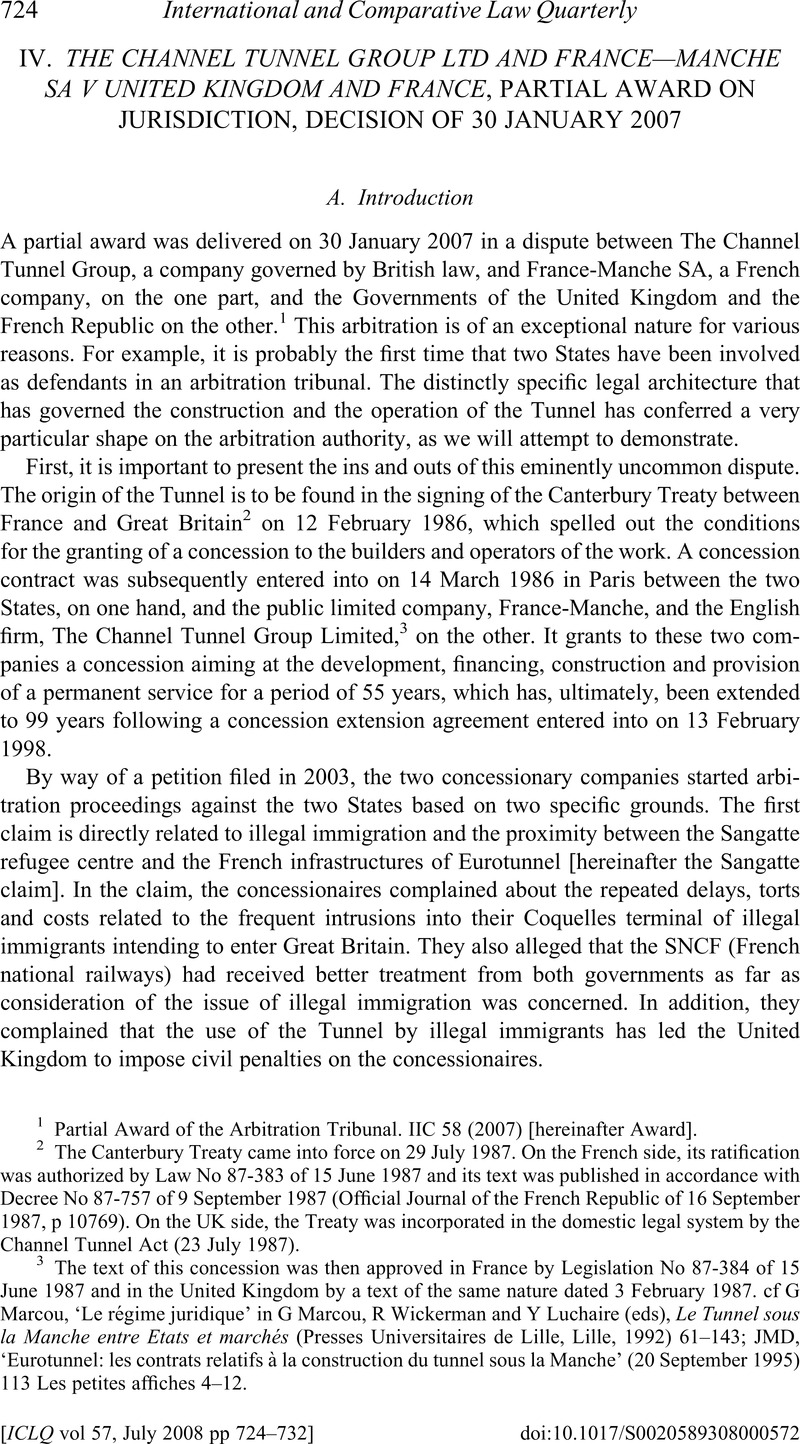Published online by Cambridge University Press: 11 August 2008

1 Partial Award of the Arbitration Tribunal. IIC 58 (2007) [hereinafter Award].
2 The Canterbury Treaty came into force on 29 July 1987. On the French side, its ratification was authorized by Law No 87-383 of 15 June 1987 and its text was published in accordance with Decree No 87-757 of 9 September 1987 (Official Journal of the French Republic of 16 September 1987, p 10769). On the UK side, the Treaty was incorporated in the domestic legal system by the Channel Tunnel Act (23 July 1987).
3 The text of this concession was then approved in France by Legislation No 87-384 of 15 June 1987 and in the United Kingdom by a text of the same nature dated 3 February 1987. cf G Marcou, ‘Le régime juridique’ in G Marcou, R Wickerman and Y Luchaire (eds), Le Tunnel sous la Manche entre Etats et marchés (Presses Universitaires de Lille, Lille, 1992) 61–143; JMD, ‘Eurotunnel: les contrats relatifs à la construction du tunnel sous la Manche’ (20 September 1995) 113 Les petites affiches 4–12.
4 Award, paras 24–27.
5 Award, paras 353–94.
6 D pub No 87-870 (23 October 1987) (Official Journal of the French Republic of 29 October 1987, 12572).
7 Award, paras 101 and 110.
8 ibid.
9 Award, paras 130–31.
10 Award, para 103.
11 See, eg, the decision adopted in 1939 by the PCIJ in the case of The Electricity Company of Sofia and Bulgaria in Award, para 124.
12 See, eg, the case of Island of Kasikili/Sedudu between Botswana and Namibia in 1999, Award, para 153.
13 Award, para 152, which referred to the Mox Plant dispute between Great Britain and Ireland. On this case, see S Maljean-Dubois and J-Ch Martin, ‘L'affaire de l'Usine Mox devant les tribunaux internationaux’ (2007) 134 Journal du droit international 437–71.
14 Iran Islamic Republic v United States of America (Preliminary Exception) [1996] ICJ Rep 803.
15 Award, para 135.
16 Award, para 135: ‘It is necessary to ask whether the breaches pleaded by the Claimants do or do not fall within the provisions of the Concession Agreement from which alone the Tribunal's jurisdiction derives’.
17 Award, para 148.
18 Award, para 153.
19 Award, para 92.
20 On this point see M Audit and C Santulli, ‘Traité, loi ou contrat ? Droit international, droit français ou droit anglais ? La délicate question du “droit de substitution” dans l'affaire Eurotunnel’ [2006] Recueil Dalloz, chron 865; adde, M Audit, Les conventions transnationales entre personnes publiques (LGDJ, Paris, 2002) Nos 46–50.
21 Award, para 92. See also para 146: ‘The Concession Agreement is a free-standing agreement governed by international law’. Also at para 338: ‘It is international law, not the law of either State, which is the proper law of the Agreement’.
22 Award, para 92.
23 S Schwebel, ‘On whether the breach by a State of a contract with an alien is a breach of international law’ in Universities of Geneva, Milano and Rome (eds), Essays in Honour of Roberto Ago (Giuffre, Milano, 1987) Vol III, 401–14; P-Y Tschanz, ‘The contributions of the Aminoil award to the law of state contracts’ (1984) 18 International Lawyer 245–81. See generally J-M Jacquet, ‘Contrats d'Etat’ [1998] Juris-Classeur Droit international, fasc 565–60.
24 P Weil, ‘Problèmes relatifs aux contrats passes entre un Etat et un particulier’ (1969) 128 Recueil des Cours de l'Académie de la Haye 95, 189; adde, from the same author, Droit international et contrat d'Etat in Mélanges Reuter (Pedone, Paris, 1981) 549–82.
25 Award, para 91.
26 Award, para 93. Article 33 of the Vienna Convention of 1969 provides the following: ‘
1. When a treaty has been authenticated in two or more languages, the text is equally authoritative in each language, unless the treaty provides or the parties agree that, in case of divergence, a particular text shall prevail.
2. A version of the treaty in a language other than one of those in which the text was authenticated shall be considered an authentic text only if the treaty so provides or the parties so agree.
3. The terms of the treaty are presumed to have the same meaning in each authentic text.
4. Except where a particular text prevails in accordance with paragraph 1, when a comparison of the authentic texts discloses a difference of meaning which the application of articles 31 and 32 does not remove, the meaning which best reconciles the texts, having regard to the object and purpose of the treaty, shall be adopted.
’
27 Award, para 92.
28 Award, para 92.
29 Award, para 162.
30 Award, para 165.
31 Award, para 174.
32 Award, para 176.
33 Award, para 187.
34 Award, para 275.
35 ibid.
36 Award, para 324.
37 Award, para 308.
38 Award, para 309.
39 Award, para 315.